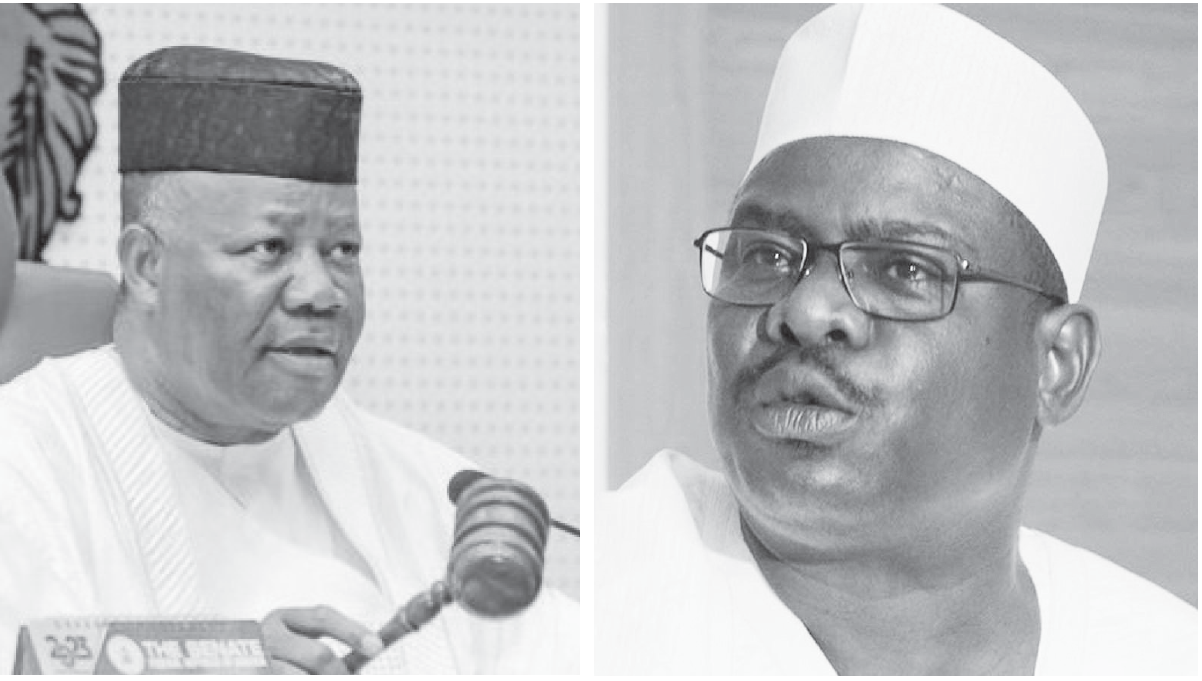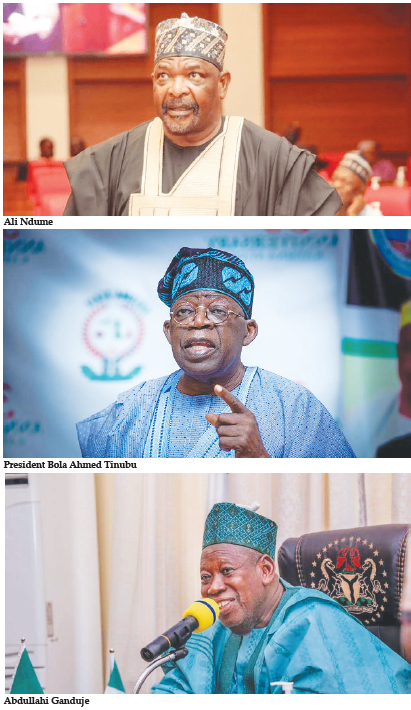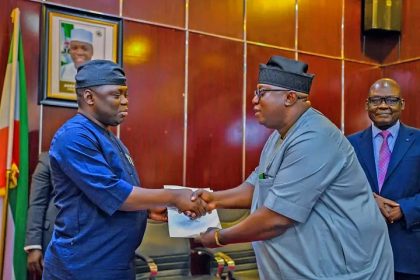By Aondover Tyowase
It was less than one year since inauguration when the 10th Senate under the leadership of Senator Godswill Akpabio sent one of its ranking members, Senator Abdul Ningi on a three-month suspension.
Senator Abdul Ningi (PDP Bauchi) was punished for alleging that Nigeria’s 2024 budget was padded and that the country was implementing two separate budgets.
Ningi held that the 2024 money law was padded to a tune of N3.7 trillion, representing more than 10% of the N28.78 trillion budget.
It was the chairman, Senate panel on Appropriation, Senator Solomon Olamilekan who rose through a motion of urgent national importance and asked the Senate to administer punitive measures on his colleague, Abdul Ningi.
In what appeared like a predetermined measure, the Senate disolved into a committee of the whole and immediately dispatched Senator Abdul Ningi on a three-month suspension with a caveat that he may be recalled if he shows remorse.
It is important to note that Senator Abdul Ningi stood by his allegations that there was grand conspiracy against Nigerians.
The summary of Senator Ningi’s allegations was to announce to Nigerians and the world at large that there was suspected sleaze and financial malfeasance in the Red Chamber.
The whistle blown by Ningi was then perceived by the Senator Godswill Akpabio-led Senate as violation of senator’s rights and an attack on their acclaimed integrity.

Suffices to say that the 2024 national budget had shown signs of controversy since its presentation by President Tinubu on November 29, 2023 when it arrived the National Assembly more than two months behind schedule. Most remarkably, it was without full disclosure of its contents to lawmakers.
Then there was another controversy that the Presidency wanted the money bill, being his first, passed soon after its presentation. And so it was, and then signed into law on January 1, 2024.
This untidy legislative activity is clearly manifest as the National Assembly continues to approve more amendments of the 2024 money bill with Nigeria operating about four amendments of the same 2024 budget with higher figures on each amendment. This was received as a clear sign that Senator Ningi was indeed right afterall when he raised concerns about implementation of more than one budget.
Consciously or unconsciously, the Senate and the Presidency may have validated Senator Ningi’s allegations following the inconsistencies in the 2024 money law that has not yet fully found it’s bearing in addressing President Tinubu’s fiscal direction and outlook.
Unfortunately, the circumstances of the passage of the Appropriation Act, the uncertainty around its actual contents and the absence of clear indication of the budget direction, has created serious doubts about the administration’s ability to effectively manage the economy.
There is a school of thought that believes that the allegations made by senator Ningi should have been treated as a wake-up call that would ignite proper investigations rather than the regional and ethnic sentiments championed by the Senate leader Bamidele Opeyemi who argued that Ningi’s allegations were targeted at removing the Senate President Godswill Akpabio and undermining President Bola Ahmed Tinubu, both of whom are southerners.
A country that fails to plan, certainly plans to fail and to that extent, a national budget encapsulating the comprehensive plan of funds allocation to critical sectors for developments must be transparent. This underscores the importance of budgeting that requires critical thinking rather than ethnic or regional approaches that take attention away from the main issues of suspected malfeasance around a national budget.
It is important to stress that since the signing into law of the 2024 money bill, the economy has been on the geometric-nosedive.
Predicated on the naira exchange rate of N750 per $1, production volume of 1.78 million barrels of crude oil at $77.96 per barrel and a Gross Domestic Product (GDP) growth forecast of 3.76%, it is unclear how the 2024 budget will accomplish its set goals when the Naira value has dipped unprecedentedly, exchanging at more than double the budget parameter. The projected rate of inflation of 21.4% in the budget now seems like a mirage with the inflation rate rising up to 29.9% in January 2024. The interest rate stands at 18.75% as announced by the Monetary Policy Committee of the Central Bank of Nigeria in July 2023.
While the uncertainty about the 2024 budget ,which Senator Ningi pointed out in March, earning him a three-month suspension, the
Senate embarked on yet another amendment when it passed another N6.2 trillion, presented for consideration by President Bola Tinubu on July 17.
This was sequel to the presentation and adoption of a report of the Committee on Appropriations on the bill by its Chairman, Senator Solomon Olamilekan .
Senator Olamilekan in his presentation said out of the N6.2 trillion,N3.2 trillion was for capital expenditure, while N3 trillion was for recurrent expenditure.
The refusal of the 10th Senate to address the early signs raised by Ningi has created more uncertainty and will potentially affect effective accountability and challenges for the Accountant General’s office as well as the Auditor General’s annual reports giving this series of amendments that comes with higher figures a few months to the end of the fiscal year.
It was on the heels of this uncertainty of the economy that has given birth to economic hardship that prompted Senator Ali Ndume to voice his frustration.
Senator Ndume had accused President Bola Ahmed Tinubu of being caged and oblivious of the challenges and hardship in Nigeria .
Again, rather than address the message, the Senator Akpabio-led Senate again went on the overdrive by first stripping Senator Ndume of his position as Chief Whip, acting on a letter from the national leadership of the All Progressives Congress.
Senator Ndume’s sins were basically that he took a swipe at the President, just as Senator Ningi did. Why must they criticise the president? It seemed to have been questioned.
But it is important to note that there are several political parties in the 10th Senate and rightly, the party with majority of senators takes all majority offices and in this case, the All Progressives Congress.
Therefore, the removal or replacement of any majority office holder ought not to be determined through a voice vote of senators, irrespective of their political or party affiliations.
It is on record that it was Senator Akpabio who supervised the removal of Senator Ndume as Whip, but meanwhile the Borno-born politician was his Campaign Director during the build up to the elections of presiding officers of the 10 Senate.
Through a voice vote that could not be said to objectively reflect the wishes of the majority, the Senate President removed Ndume and replaced him with Senator Tahir Monguno. He was also stripped of his vice chairmanship of the Appropriations Committee as well as member of the selection committee on the directive of the leadership of the APC.
Akpabio may have thrown his campaign Director General under the bus for daring to call-out President Tinubu, but the issues raised by the Borno Senator have remained uncontradicted leading to more hunger , frustration and squalor.
The current Senate, according to watchers of democracy, might just go into history as the most intolerant to opposing views and one that acts purely on the whims and caprices of the same executive it ought to oversight via means of checks and balances.
The Senate under Akpabio still has over two years more to disabuse the minds of Nigerians that the Senate under his watch is not executive rubber stamp afterall.








